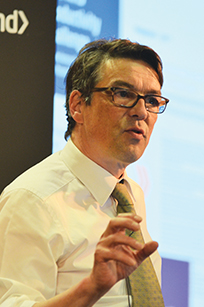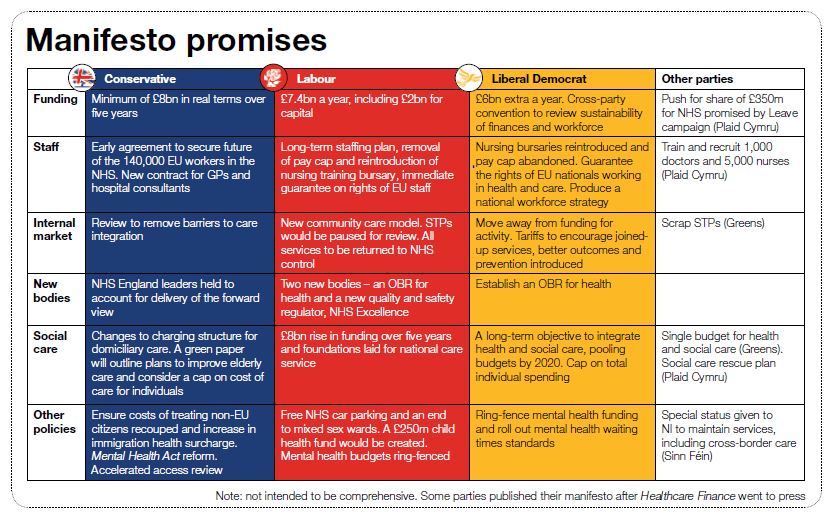News / Funding shortfall likely despite increases promised in main party manifestos
The NHS in England will face a funding shortfall, no matter which party gains power in the 8 June general election, according to the Nuffield Trust.
In an analysis of the main parties’ manifesto spending pledges on health, the trust said that although all of them pledged to increase funding, it would not be enough to close the funding gap, cope with increased demand and sustain high-quality care.
It said the NHS would require £137bn to £155bn a year by 2022/23, based on four scenarios – if the NHS kept pace with: economic growth (£137bn); NHS inflation and predicted demand (£141bn); the long-term spending trend (£150bn); and the projections from the Office for Budget Responsibility (£155bn).
In their manifestos, the parties described funding increases in different ways. The Conservatives promised to increase funding by £8bn over the next five years, Labour talked of a £7.4bn increase and the Liberal Democrats £6bn for health and social care. The trust said that by 2022/23 these pledges would amount to overall spending of £131.7bn (Conservatives), £135.3bn (Labour) and £132.2bn (Lib Dems).

Nuffield Trust chief economist John Appleby (right) said: ‘This analysis shows that none of the parties’ promises matches even the lowest projections of what funding should be.
‘Spending as a proportion of GDP [gross domestic product] looks set to fall whichever party forms the next government, unless additional funds can be found.’
The Health Foundation predicted similar spending – £136bn Labour, £134bn Lib Dems and £132bn Conservatives – and said spending pressures would amount to £153bn by 2022/23. It also agreed that spending as a proportion of GDP would fall under an administration led by any of the main parties.
In a blog, Anita Charlesworth, the foundation’s director of research and economics, said: ‘This is a stark prospect for the NHS. While extra funding is welcome, none of the parties have found a way of avoiding five more very tough years for the health service. This doesn’t seem to be because our politicians want to accept a lower quality healthcare service, but rather reflects the scale of the challenge presented by growing pressures on the service with an economy still feeling the aftershocks of the 2008 recession.’
Though many predicted the election would be fought solely on the UK exit from the European Union, health policy is prominent in all three main party manifestos.
The Conservatives said that, if returned to power, they will review the operation of the internal market. The manifesto said the market can ‘fail to act in the interests of patients and creates costly bureaucracy’. Modifications that do not need legislative changes will be made in time for the start of the 2018/19 financial year.
‘The pledge to review the internal market is a significant acknowledgement that collaboration rather than competition offers the best way of sustaining and transforming services,’ said King’s Fund chief executive Chris Ham.
Labour said it would pause all work on sustainability and transformation plans for a review. Professor Ham said: ‘The proposal risks holding back essential changes to services. Labour are right that there has so far not been nearly enough engagement with the public and patients and this needs to happen, but where the case for change has been made politicians should not stand in the way.’
Both Labour and Lib Dems would lift the 1% ceiling on NHS pay rises and establish an Office for Budget Responsibility-style body for health to oversee spending and look at future needs.
The impact of an EU exit on the NHS was acknowledged in the manifestos, with Labour and the Liberal Democrats promising to guarantee the rights of EU citizens working in the health and care services, while the Conservatives said keeping these staff would be a priority in negotiations.

Related content
We are excited to bring you a fun packed Eastern Branch Conference in 2025 over three days.
This event is for those that will benefit from an overview of costing in the NHS or those new to costing and will cover why we cost and the processes.